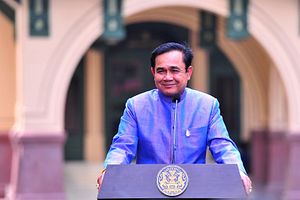Since 1932, there have been 18 military coups that have overthrown the ruling Thai governments. In 2014, Thailand experienced its 19th led by General Prayuth Chan-o-cha. Prayuth’s latest junta with its accompanied National Council for Peace and Order (NCPO) toppled Yingluck Shinawatra and her extended clan on grounds of corruption, disrespecting the monarchy, and not uniting or bringing prosperity to the Thai people. But this military clampdown on dissenting political figures is rather a seizure of absolute power lending itself to a military dictatorship. What was supposed to be a caretaker cabinet to accelerate a democratic transition, purging the ill affected from governing over the Thai people, the new moral “soldier with a democratic heart” has thwarted freedoms, civil liberties, and any opposition through fear and silence.
His roadmap to a new democracy mirrors itself to an antiquated authoritarianism. The absence of accountability or oversight mechanisms on Prayuth’s actions allows the junta to pass new laws such as the banning of public gatherings (no more than five to a group), the cancelling of political events and academic panels, the blocking of more than 200 websites, pulling off air satellite TV and radio stations that broach political discourse, along with print media that voice similar commentary, all in the name of threatening national security. Further depressing democratic freedoms, civilian courts have been replaced with military courts for many offenses, which do not tend to observe international fair trial standards. After publishing five Facebook posts confronting the new governing junta, or rather, “threatening national security,” a citizen received a 50-year prison sentence (25 years once he pleaded guilty) for this “lèse-majesté” offense. And with the new election date continuously being pushed back, the NCPO’s and military authorities’ unchecked powers will unceasingly repress fundamental social rights for its citizens. The case has become even worse for migrants and victims of human trafficking.
This past year, alone, Thailand has seen over 25,000 migrants and victims of human trafficking reach its borders. Bangladeshi and Muslim Rohingya from neighboring Bangladesh and Myanmar make up the majority of this figure. Those from Myanmar are part of the marginalized and citizenship-less ethnic minority fleeing from the violence inflicting Buddhist majority. Most Bangladeshis are economic migrants. Both groups of migrants are victims of human trafficking, as there vulnerable position makes them easy targets for traffickers. This has led them to undergo horrific conditions, either at sea on overcrowded boats for weeks or months at a time with less than a cup of water and a spoon of rice a day, undergoing imprisonment, violence, abuse, or even death; or in traffic camps in the Thai jungles, suffering similar abysmal circumstances. Mass graves have been found near the land-camps, and many bodies in the sea. Thailand has launched a crackdown and investigation on the situation. Yet, Prayuth’s moral compass has not guided the situation to humane ends.
While Malaysia and Indonesia have opened their borders to victims and migrants (albeit, currently for only one year), Thailand claims it can no longer take in any more new arrivals. Thailand has not signed the UN Refugee Convention, and has restricted access to UN agencies in investigating the situation further. Thailand has begun to clamp down on smugglers and traffickers, which has caused many of them to abandon ships full of people found on the high seas. Still, the current government is playing maritime “Ping-Pong” and avoiding the rescue of these lives. When migrants escape from their traffic camps, Thai security forces often treat victims as criminals. Other discrepancies also remain. The ruling military, a supposed force for cleaning away the corrupt, has reaped in profitable rewards from some of these illegal activities. The U.S. State Department released a report tying Thai police and army officials to trafficking rings and smugglers. Yet, among the 80-150 people that were recently arrested in connection with trafficking incidences, only one army official was among them. As many Thai officials are tied to the trafficking network, the junta is not keen on focusing their energy to combat this transnational crime.
While the junta is consolidating its power through constitutional revisions and clamping down on political opposition, thousands of lives are being lost. The systematic lack of respect for human rights and human life is something Thailand’s western partners cannot ignore. Yet, neither the United States nor the European Union has put any pressure on Prayuth to address the root cause of the problem. The EU is supposed to be a beacon for social and fundamental rights, but its actions have only taken it as far as superficially wagging its finger at the current Thai leader. Both the United States and the European Union can do more. With the Thai economy having already suffered a 4.2 percent loss this past year due to the government’s destabilization, the EU’s 30 billion Euros per year in bilateral trade with Thailand can serve as leverage to create a change in the junta’s practices. Thailand also needs to reform the role of its governing elites and monarchy. Prayuth was able to successfully confiscate power in a national tradition that is strongly rooted in a culture of patronage where the monarchy is at the apex. This kind of tradition intrudes on the road to a liberal democracy. The U.S. and the EU can facilitate such a transition, influencing younger generations through liberal education and a greater exposure to democratic principles as a path to modernity. The more superficial a reaction the U.S. and the EU have toward Thailand’s response to the crisis, the more window dressing Thailand will fabricate as a means to control the crisis as a public relations issue, rather than approaching it as the mass violation of fundamental human rights it is in reality. It is time for these Western powers to act.
The author is a London-based researcher.

































